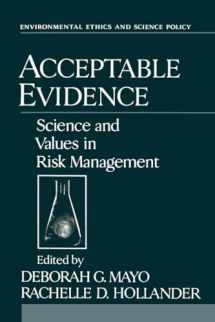
Acceptable Evidence: Science and Values in Risk Management (Environmental Ethics and Science Policy Series)
Book details
Summary
Description
Discussions of science and values in risk management have largely focused on how values enter into arguments about risks, that is, issues of acceptable risk. Instead this volume concentrates on how values enter into collecting, interpreting, communicating, and evaluating the evidence of risks, that is, issues of the acceptability of evidence of risk. By focusing on acceptable evidence, this volume avoids two barriers to progress. One barrier assumes that evidence of risk is largely a matter of objective scientific data and therefore uncontroversial. The other assumes that evidence of risk, being "just" a matter of values, is not amenable to reasoned critique. Denying both extremes, this volume argues for a more constructive conclusion: understanding the interrelations of scientific and value issues enables a critical scrutiny of risk assessments and better public deliberation about social choices. The contributors, distinguished philosophers, policy analysts, and natural and social scientists, analyze environmental and medical controversies, and assumptions underlying views about risk assessment and the scientific and statistical models used in risk management.


We would LOVE it if you could help us and other readers by reviewing the book
Book review



